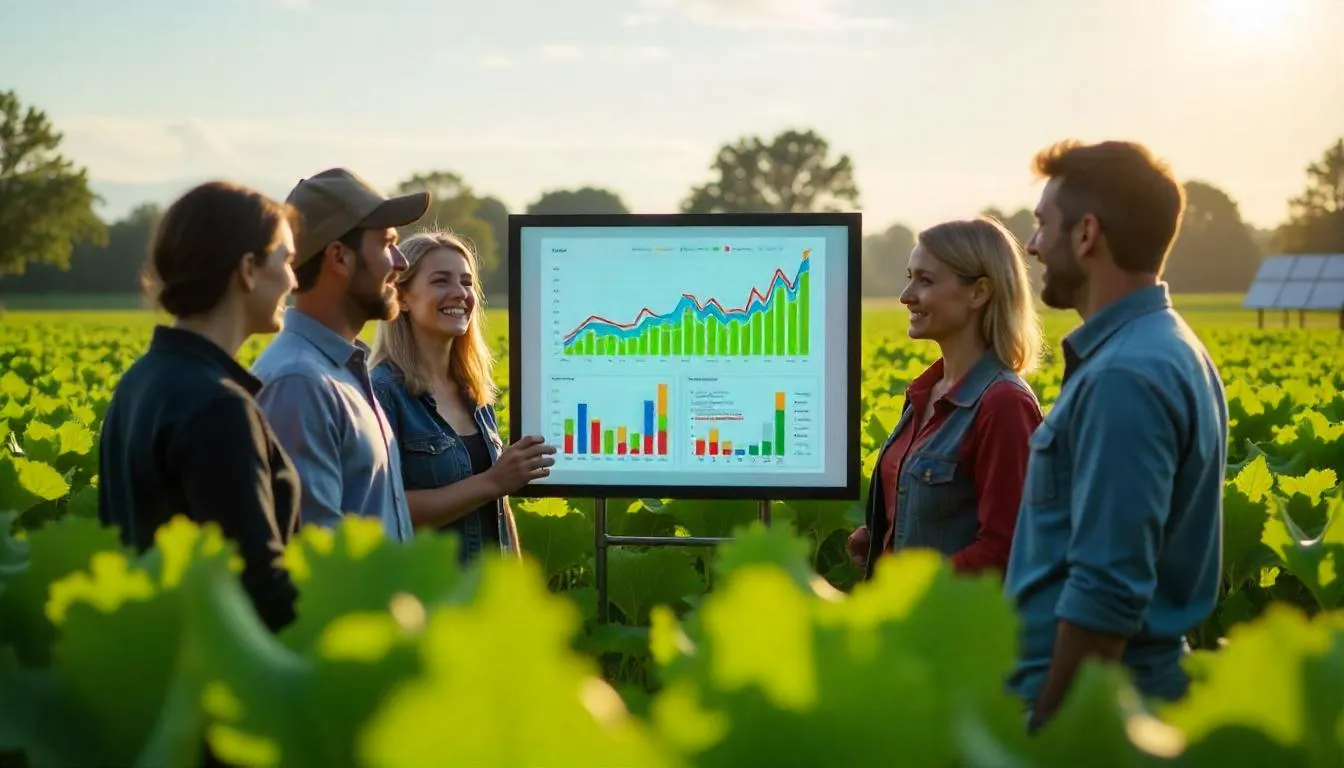Farmland investment in India has recently seen an exciting transformation. Once considered a niche market, it has become a growing sector attracting investors looking for stability, sustainability, and high returns. With advances in technology, government support, and rising consumer demand for organic produce, the managed farmland market in India presents numerous opportunities.
In this comprehensive guide, our expert from Sanjeevani Farms will walk you through the current trends in Managed farmland market in India in 2024. You’ll gain valuable insights into how the sector is evolving and discover how Sanjeevani Farms is addressing key challenges, offering investors a seamless, sustainable approach with attractive returns on investment.
Why Managed Farmland is Gaining Popularity?

Managed farmland is rapidly gaining traction in India for several reasons:
- Growing Interest in Sustainability: A report from the Indian Organic Farming Association indicates that the organic farming market in India is projected to reach ₹70,000 crore by 2025, fueled by growing consumer interest in healthy and eco-friendly food options.
- Shift towards Organic Farming: Organic farming is not just a trend but a response to concerns over the use of chemicals in agriculture. India is seeing an increasing demand for organic produce, both locally and for export.
- Lifestyle and Investment Appeal: Managed farmlands provide the best of both worlds: a sustainable lifestyle combined with strong investment returns. Whether it’s enjoying a retreat in the countryside or earning income from agricultural activities, these farmlands cater to the needs of investors seeking peace and profitability.
Insights and Latest Trends in Managed Farmland Market in India

India’s farmland market is undergoing significant transformations, presenting lucrative opportunities for investors.
Here’s a quick breakdown of the key trends and statistics shaping the industry:
Agricultural Land Area & Market Growth
India holds 141 million hectares of agricultural land, ranking as the second-largest in the world. The Indian agriculture market is valued at USD 372.94 billion in 2024 and is set to reach USD 473.72 billion by 2029, growing at a CAGR of 4.90%. This growth highlights the long-term potential of farmland investments.
ROI & Land Value Appreciation
Managed farmland can offer an ROI of up to 15% annually, driven by crop yields, soil health, and rising demand for organic produce. Karnataka, Tamil Nadu, and Maharashtra are seeing annual land value appreciation of 6% to 15%, boosted by urban expansion.
Key Trends in Managed Farmland Market in India
- Agricultural Land Area: India has 141 million hectares of agricultural land, providing abundant opportunities for investment.
- Market Size: The Indian agricultural market is projected to grow from USD 372.94 billion in 2024 to USD 473.72 billion by 2029, growing at a CAGR of 4.90%.
- Land Value Appreciation: Land values in areas like Bangalore, Hyderabad, and Maharashtra are appreciating at rates between 6% to 15% annually, driven by urban expansion and infrastructure development.
- Return on Investment: Managed farmland investments can yield an ROI of up to 15% annually, with additional benefits from land appreciation and crop yields.
- Government Initiatives: Programs such as PMKSY and DILRMP are enhancing irrigation and land record management, further promoting sustainable and profitable agricultural practices.
Factors Influencing Current Trends in Managed Farmland Market in India
India’s agriculture sector is witnessing a major shift, driven by a combination of technological advancements, government schemes, and the growing interest in sustainability.
Here’s a closer look at the factors influencing current trends in managed farmland market:
Technological Advancements
Modern farming technologies, including precision farming, drones, and AI, are increasing productivity and efficiency. These innovations are reducing operational costs and improving returns, making managed farmland a more attractive investment.
Government Support
Government initiatives like Pradhan Mantri Krishi Sinchai Yojana (PMKSY) and DILRMP are enhancing irrigation systems and land record management, boosting farming productivity and ensuring long-term stability for the agricultural sector.
Sustainable Farming & Organic Growth
Sustainable farming and organic produce are becoming more popular due to rising environmental concerns and growing consumer demand. This trend offers investors the chance to tap into higher returns from eco-friendly farming practices. The shift to organic farming is not just an environmental concern but also a lucrative business opportunity as both domestic and international markets favor organic products.
Impact of Urbanization
Urban expansion around major cities like Bangalore in Karnataka, Chennai in Tamil Nadu, and cities in Maharashtra is converting agricultural land into residential and commercial properties, driving up land values. This presents an opportunity for farmland investors to profit from land appreciation and growing demand for real estate.
Is It a Good Time to Invest Based on Current Trends in Managed Farmland Market in India?
Yes, it is an opportune moment to invest in managed farmland in India. The sector is experiencing significant growth, driven by evolving market trends, government initiatives, and increasing consumer demand for sustainable agricultural practices.
Here’s why:
Rising Consumer Awareness
Indian consumers are shifting toward organic and sustainable produce. This trend is boosting the demand for managed farmland focused on organic farming practices, offering promising returns for investors.
Urban Expansion Driving Farmland Demand
The proximity of farmlands to growing cities like Bangalore and Chennai is increasing their value. Strategic locations near urban hubs offer strong potential for land appreciation and easier access to markets.
Global Supply Chain Shifts
India’s role as an agricultural export hub is expanding, with a focus on meeting international standards. Managed farmland is well-positioned to leverage this opportunity, increasing profitability for investors.
Affordable Entry Points
Agricultural land remains more affordable than urban real estate, offering a cost-effective investment option. Tax benefits on agricultural income further enhance its appeal.
Shift to Passive Income Models
Managed farmland solutions provide end-to-end management services, allowing investors to earn passive income without the need for active involvement.
Climate Resilience Efforts
Managed farmland projects are integrating climate-resilient and sustainable farming techniques, ensuring long-term productivity despite environmental challenges.
Boost in Agri-Tech Investments
With increased investments in agricultural technology, managed farmlands are adopting modern practices that enhance efficiency, productivity, and profitability.
The current trends in Managed Farmland market in India in 2024 clearly indicate a growing opportunity for investors seeking stable returns, sustainable practices, and long-term value growth.
How to Choose the Right Managed Farmland for Investment?

When investing in farmland, location and farm management are key factors in determining your success. Here are some strategies to help you choose the right managed farmland:
Location Analysis
Location is crucial for any farmland investment. Choose regions that have:
- Good infrastructure: Look for areas near urban centers, highways, and markets.
- Fertile Soil and Adequate Water Supply: These are essential for high yields.
- Climate Conditions: Ensure the region’s climate supports the type of farming you wish to invest in.
Regions with high agricultural potential and proximity to growing cities like Bangalore, Hyderabad, and Chennai are highly recommended for farmland investment.
Land Type Selection
Choose the type of farmland based on the investment’s goals:
- Arable land for annual crop cultivation like grains, vegetables, and fruits.
- Pastureland for livestock and dairy farming.
- Orchards for long-term fruit-bearing trees, which require more time and care but can yield high returns over the years.
Crop or Livestock Selection
Deciding between crop farming and livestock farming will depend on the specific goals of the investor. Crops provide annual returns, while livestock farming offers more long-term income.
Evaluate Farm Management Services
Select a farmland management company with a proven track record of success. They should be able to demonstrate expertise in sustainable farming practices, a deep understanding of the local market, and transparent operations.
Why Choose Sanjeevani Farms?

Investing in farmland comes with its set of challenges, but Sanjeevani Farms ensures that investors can overcome these hurdles seamlessly.
Here’s how Sanjeevani Farms helps you turn these challenges into opportunities:
High ROI (Up to 15%)
One of the primary concerns of farmland investors is the return on investment. At Sanjeevani Farms, you can expect up to 15% ROI annually, derived from both crop yield and land appreciation. This ensures that your investment grows in value, providing steady financial rewards.
- Up to 15% ROI per year
- Returns from crop yield and land appreciation
Hassle-Free, Managed Farmland
Farmland management can be time-consuming and requires specialized knowledge. With Sanjeevani Farms, all aspects of the land’s management are taken care of, from planting and irrigation to maintenance and harvesting. This hands-off approach ensures that your investment remains productive without your involvement.
- End-to-end management (no involvement required)
- Planting, irrigation, and maintenance handled
- Stress-free, hands-off investment
Expert Management and Support
Sanjeevani Farms offers expert management, guiding you through every step of your investment. From choosing the right crops to adhering to regulations, their team ensures your farmland is cultivated efficiently, sustainably, and profitably.
- Experienced team for daily operations
- Sustainable farming practices ensuring long-term success
- Regulatory compliance handled for you
Peaceful Country Living with Financial Gains and Eco-Tourism Opportunities
Along with attractive returns, Sanjeevani Farms offers a serene country living experience. Investors not only benefit from crop yield and land appreciation but also have the opportunity to start eco-tourism activities on the farm. These activities can create additional passive income through farm stays, farm tours, and organic product sales, making the investment even more rewarding.
- Passive income from eco-tourism and organic products
- Peaceful environment away from city life, with a sustainable income stream
Legal and Regulatory Compliance Simplified
Legal complexities are often a significant barrier for farmland investors. Sanjeevani Farms handles all legal processes, including land ownership documentation, tax compliance, and adherence to agricultural regulations, ensuring you are fully compliant without any stress.
- All legal paperwork is handled by Sanjeevani Farms
- Land ownership documentation and tax compliance taken care of
- Full transparency and peace of mind
Transparent Investment Process
Transparency is key to building trust with investors. Sanjeevani Farms offers a clear and open investment process, providing regular updates on farm progress and performance. This ensures that you’re always informed and confident in your investment.
- Clear investment structure and easy-to-understand terms
- Regular updates on farm performance and growth
- Open communication at every step of the investment
By investing in Sanjeevani Farms, you are not only securing a profitable venture but also enjoying a stress-free, sustainable farming experience. Whether it’s the reliable ROI, expert management, or the potential for passive income through eco-tourism, Sanjeevani Farms ensures that every investor’s journey is smooth and successful.
Conclusion
Investing in managed farmland in India offers a unique opportunity for both financial growth and sustainable farming. With the right location, farm management company, and investment strategy, farmland can provide high ROI, long-term asset appreciation, and the satisfaction of supporting eco-friendly farming practices.
Sanjeevani Farms is an excellent choice for investors looking to enter the farmland market, offering high-quality farm management, transparent operations, and a proven track record of success. With Sanjeevani, you can navigate the complexities of farmland investment and enjoy hassle-free, profitable returns.
FAQs on Current Trends in Managed Farmland Market in India in 2024
Here are some frequently asked questions (FAQs) about the current trends in the managed farmland market in India to help you understand the key factors shaping this growing investment opportunity.
What are the main factors driving the growth of the managed farmland market in India?
The current trends in managed farmland market in India are shaped by a growing demand for organic food, better infrastructure, and sustainable farming practices. These factors make farmland a more appealing investment option.
Is it a good time to invest in the managed farmland market in India?
Yes, given the latest trends in managed farmland market in India, now is a great time to invest. With rising demand for organic produce, along with stable returns, farmland provides long-term growth potential.
How does urban growth affect farmland investment opportunities in India?
Urbanization is boosting the value of managed farmland, especially in areas close to major cities. As cities expand, farmland near urban centers becomes more valuable, making it an attractive opportunity for investors.
How is the demand for organic farming influencing the managed farmland market in India?
With increasing awareness around health and sustainability, the demand for organic produce is rising. This trend in the current managed farmland market in India is pushing investors to focus on organic farming for higher returns.
What role does technology play in the managed farmland market in India?
Technology is enhancing efficiency in the current trends in the managed farmland market in India. Precision farming, advanced irrigation systems, and data-driven agriculture are helping boost productivity and returns for farmland owners.





